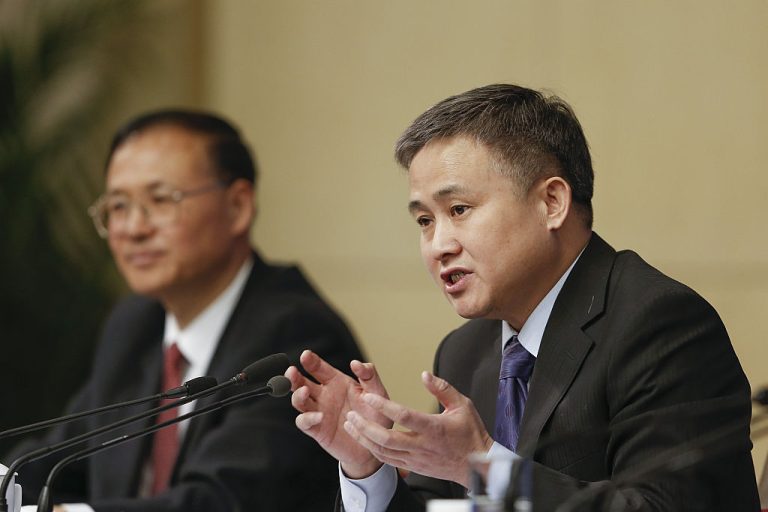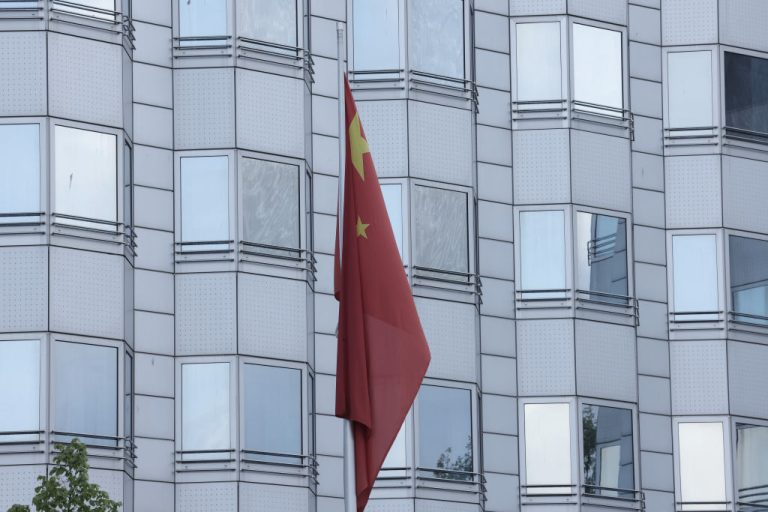The Chinese authorities are set to consolidate command of its central bank, the People’s Bank of China (PBoC), behind Pan Gongsheng, who has as of time of writing, only been officially promoted to Communist Party secretary of the PBoC.
July 1 reporting from South China Morning Post says that Pan is set to take over the position from Yi Gang, who will step down after serving since 2018, according to official announcements.
SCMP made the determination based on comments from “industry insiders speaking on condition of anonymity” paraphrased as stating “appointments of party posts usually precede government positions.”
The outlet also said that Yi and former PBoC Party secretary Guo Shuqing are said to be entering retirement.
The assumption that Pan will take the governor’s seat is also widely reported in network media outlets such as CNN.
READ MORE
- China’s Delayed Census Points to Severe Population Decline
- Xi Cracks the Whip on Social Lives of ‘Leading Cadres’ in the Military
- China Withholds Cremation Data From Public Statistics
Success
You are now signed up for our newsletter
Success
Check your email to complete sign up
China’s economy is not healthy following the country being wracked by the novel coronavirus pandemic and the societal consequences of the Chinese Communist Party’s “zero-COVID” ‘policies.
Although the Hang Seng and the Hang Seng Tech Indexes, which track the Chinese stock market, enjoyed a brief rally to begin 2023, the gains not only came on the back of all time lows set in October 2022, but had already given back more than 50 percent as soon as the end of May.
And the pains reflect in the value of the yuan, a notable development because the currency’s peg to the US dollar is not determined in a free market, but centrally determined by the PBoC.
After trading at an all time low of almost US $7.38 to one yuan in October 2022, China’s currency enjoyed a reprieve to $6.7 by February, but appears to be set to print even worse prices this year as it trades at $7.26 as of July 5.
The swings represent exceptional and outsized volatility for forex markets. For every $100,000 lot traded in currency markets, each 1 cent move represents $1,000 in profit and loss.
The rapid decline in national currency value forced the PBoC under Yi Gang to sell an undeclared amount of its precious U.S. dollar reserves in an attempt to stabilize the currency, Reuters reported on June 27.
However, the move pulled back the yuan’s descent by only 4 cents from $7.24 to $7.20 — but only for a single day. By June 30, the currency had peaked at a high of $7.28.
To put the magnitude — or lack thereof — of the measures into perspective, when the Bank of Japan was forced to intervene in its forex markets to stop an out of control yen that had rampaged from 115 yen to the U.S. dollar last April to more than 145 yen by September, the bank was able to knock the price back to 140 in a single hour of trading by selling U.S. treasuries.
But the yen was similarly unaffected, continuing to rally into October at a peak over 151 before the BOJ stepped in again.
This time, the Japanese central bank sent the markets from 151 yen to 146 in a matter of minutes, bringing the rally to an abrupt end.
But the value drop of the Chinese yuan and the Japanese yen are similar in pattern. The yen fell to 127 points by February, but has since rallied back to the crucial 145 mark.
Notable is that currency volatility in the two Asian markets are unrelated to the strength of the U.S. dollar, which opened the year at slightly under 103.5.
As of time of writing, the dollar trades at 103.8 and has been no higher this year than 105.88, compared to a 2022 high of 114.77.
Foreign exchanges may be at the core of the PBoC restructuring. Pan is the current Party Secretary and Director of the State Administration of Foreign Exchange, China’s forex regulator.
SCMP stated that Pan, once formally appointed, will have beaten He Lifeng, a “long-time associate” of Xi’s, and Zhu Hexin, Chairman of Citic Group, a large finance firm, for the position.
Yi Gang could do little to inspire confidence in the markets. On June 9, SCMP reported the governor had relied on rhetorical statements, such as “China has strong economic resilience, big [growth] potential and ample policy space” and “[We] should have confidence and patience for China’s steady economic growth” as markets teetered.
In spite of the veneer, late June reporting on the latest batch of Ministry of Culture and Tourism statistics showed that China’s internal tourism spending for the June Dragon Boat Festival was no higher than 95 percent of what it was in 2019, before the COVID-19 pandemic.
The decline in spending was even more significant when contrasted by a 12.5 percent increase, 106 million total, in the reported number of tourism trips taken compared to 2019.
Financial Times stated in its reporting on the reshuffle that Pan will be “welcomed by market participants because of his extensive experience in the sector and western contacts and training.”
On June 9, Fan Yifei, another Deputy Governor of the PBoC, was expelled from the CCP and removed from his position after being snared in the Anti-corruption Campaign, SCMP also reported.
SCMP stated that Fan is “the most senior central banker to be placed under investigation” during Xi’s crackdown, and was declared by the Central Commission for Discipline Inspection as having “traded power for personal gain and sex” and “illegally accepting large amounts of property.”







